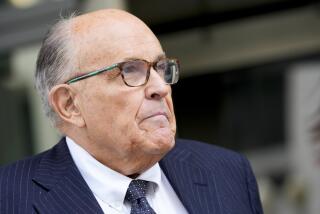Testing, totally
Under intense lobbying from Secretary of State Condoleezza Rice, Israel and the Palestinians edged toward an agreement today on opening a border crossing between Gaza and Egypt.
The crossing, at Rafah, along Gaza’s southern border, has been viewed by Palestinian leaders as an essential gateway for ordinary Gazans, and a potentially critical portal for trade.
It remains the only direct opening to the rest of the Arab world from territory that Israel handed to the Palestinians two months ago, and the failure to negotiate its permanent opening has become a symbol of Gaza’s isolation.
Seeking to nudge the two sides forward, Rice met separately today with Israeli Prime Minister Ariel Sharon and Palestinian Authority President Mahmoud Abbas.
In a sign of the Bush administration’s desire for a breakthrough on the border issue, Rice put off plans late today to fly to Asia after a brief stop in Jordan. Instead, she said she would return to Jerusalem in hopes of brokering a deal.
“We’re still working the issues with both sides,” Rice’s spokesman, Sean McCormack, said today as the secretary left for Amman, the scene of hotel bombings last week that killed 57 people.
Abbas said after his visit with Rice that the two sides had all but reached agreement. Later today, Israeli officials said a deal appeared near as talks continued.
“With some will, and with some creativity, agreement ... should be within sight,” Rice told a news conference. “I’m never going to predict precisely when this is going to come to a conclusion, but I do think they have made a lot of progress.”
Rice said envoy James Wolfensohn, who has mediated talks on border crossings and other economic issues since the Israeli pullout, had put forward new U.S. proposals to bridge differences between the two sides. Rice met for an hour today with Israeli Prime Minister Ariel Sharon.
Abbas said the two sides appeared close to an agreement and Israeli officials echoed that today as talks continued.
The difficulties in working out a solution for Rafah underscored the difficulties of resolving even comparatively minor points on the path to the much larger goal of negotiating peace and establishing an independent Palestine state. Although many had hoped the Gaza withdrawal would inject new momentum into the peace process, little progress has been made toward that vision since.
As with so many aspects of relations between the Israelis and Palestinians, the biggest barrier to resolving the border crossing issue appears to be mutual mistrust.
Immediately after Israel pulled its last soldiers from a patrol zone along Gaza’s southern border in August, Palestinian and Egyptian security guards at Rafah were overwhelmed as thousands of residents, heady with their new freedom, rushed into Egypt to visit relatives they had not seen in years or to buy goods at cut-rate prices.
The episode unnerved Israeli authorities, who have not allowed the Rafah crossing to open since then. The port was the primary means for Gaza’s 1.3 million residents to leave the impoverished coastal strip.
Rice hoped to close the remaining distance between Israel’s need for assurances of tight border controls and the Palestinians’ desire to protect their sovereignty and ensure that ordinary residents could move in and out freely.
The two sides came closer with a recent compromise that envisions the presence of European Union monitors to keep watch over crossings at Rafah. But differences remain over how much control the monitors would be able to exercise and the extent of Israel’s role in overseeing border movement, even indirectly through maintaining a database of crossers or via surveillance cameras.
“We need to augment the Palestinian [security] weakness without insulting the Palestinians,” an Israeli government official, who declined to be identified because of the subject’s sensitivity. “We know they will stop somebody carrying [weapons], but if someone big in a militant group walks across with $50,000 in a satchel, that’s five suicide bombers.”
Palestinians fear that the Israelis want to block entry of travelers blacklisted because they were previously arrested by Israeli authorities or suspected of militant activity.
Palestinians say the lack of progress on border issues has crippled the economy and undermined public support for Abbas, a pragmatist who has sought to quell militant activity. He has expressed a desire to reach peace with Israel.
“She [Rice] made it clear that she didn’t want Gaza to become a large prison, but what we see now is that Gaza is a large prison,” said Diana Buttu, an Abbas adviser.
Palestinian Authority Finance Minister Salam Fayyad gave Rice a pouch of Gaza-grown bell peppers, saying they were a sample of goods that the Palestinians have difficulty exporting because of Israeli restrictions.
Agriculture is Gaza’s economic mainstay, and the difficulties in getting produce out to the West Bank and abroad is further hurting an economy battered by years of violence, the Palestinians say. Before the Israeli pullout, Wolfensohn brokered an agreement to protect thousands of greenhouses in the evacuated Israeli settlements from destruction.
But Palestinians complained that the produce has been rotting because of long delays at the Karni crossing, the main commercial portal between the Gaza Strip and Israel. Buttu said outbound shipments through Karni had dropped from an average of 500 truckloads a day in recent years to about 20 since the Israeli withdrawal.
After touring the Karni cargo terminal Sunday, Wolfensohn threatened to leave the region if the issue of borders remained unresolved. He called the next 72 hours “vital,” an apparent reference both to the perishable nature of farm goods and to the opportunity for Rice to apply extra political leverage during her visit.
Wolfensohn, a former World Bank president, was appointed to mediate economic issues related to the Gaza withdrawal and improve the prospects for a revival of the Gaza economy. He was named to his job this year by a joint authority known as the “quartet” — the United States, the European Union, Russia and the United Nations — sponsors of the current search for peace.
More to Read
Get the L.A. Times Politics newsletter
Deeply reported insights into legislation, politics and policy from Sacramento, Washington and beyond. In your inbox three times per week.
You may occasionally receive promotional content from the Los Angeles Times.






